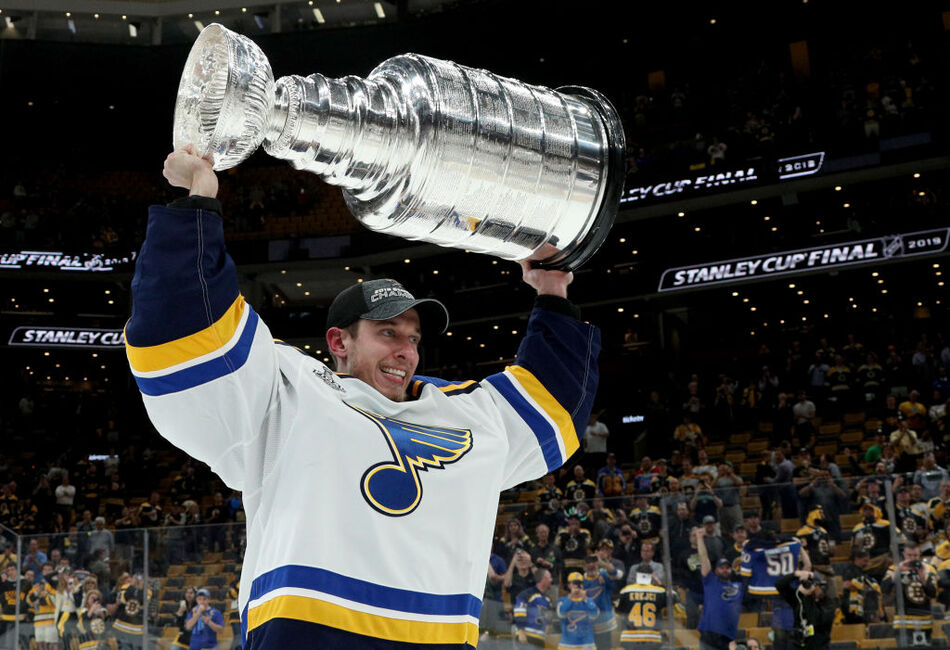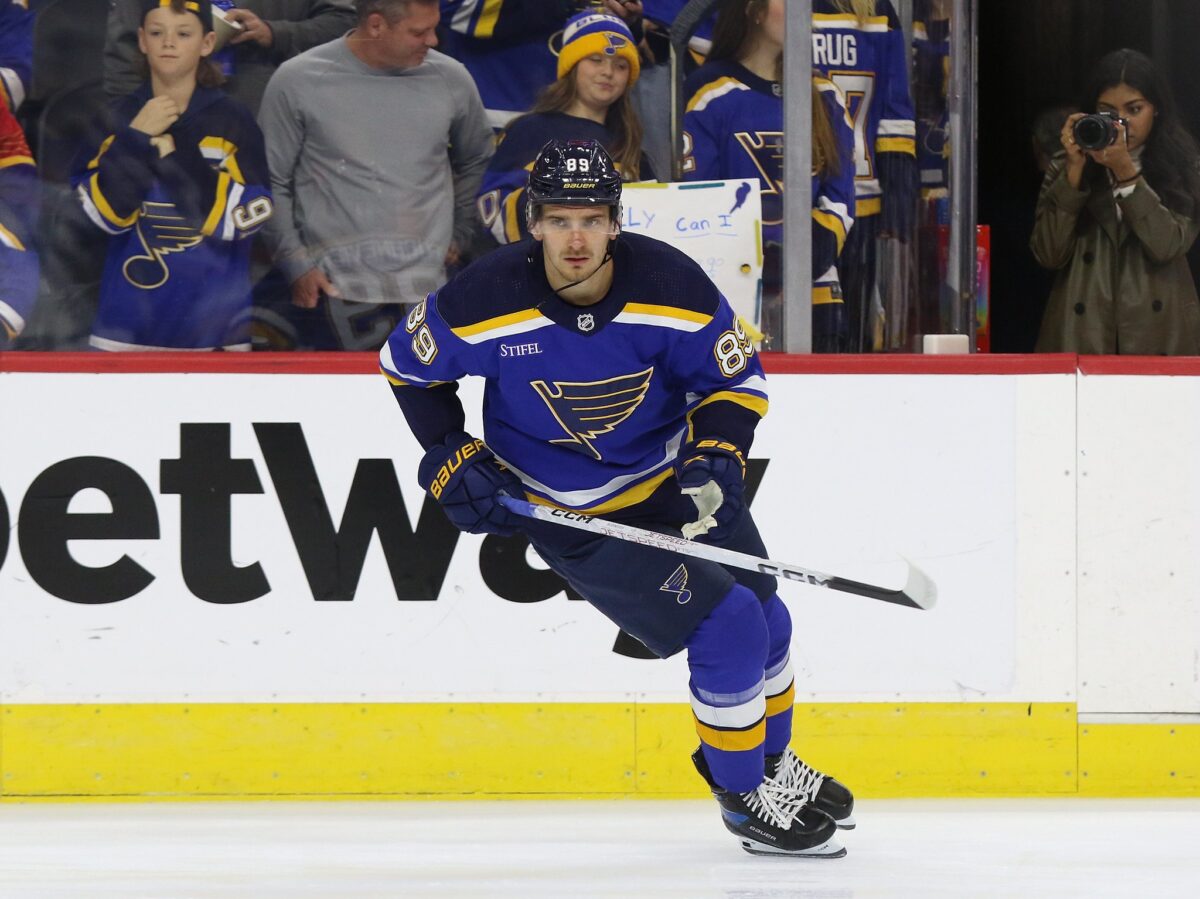Just last week, reports circulated that the New Jersey Devils are making calls around the league with interest in players filling five separate roles: a top-six and bottom-six forward, a top and a bottom-pair defenseman, and a starting goaltender. It is unlikely they could fill all those holes in a trade with only one team, but they can fill several with players from the St. Louis Blues.
The Blues are a team in transition. They have a new head coach and a general manager (GM) in waiting, as current GM Doug Armstrong indicated he will turn the reins over to Alexander Steen in two seasons. That signals that Armstrong intends to make difficult choices and try to turn over a team to Steen on the ascent with a championship window ahead of it. The Blues are now five seasons removed from their 2019 championship and have a talented but imperfect roster that needs retooling to get them back on the cusp of contention for another Cup. The best way to accomplish that would be to maximize their current assets and accumulate picks and talent.
RELATED: Devils Have Key Decision to Make With the 10th Pick in NHL Draft
Devils GM Tom Fitzgerald has a stocked arsenal of assets he could move to obtain the players he needs to build around his core. The Devils have pursued a starting goalie for almost a full year and have recently been linked most prominently to Calgary Flames goalie Jacob Markstrom. Those talks have seemed to hit a snag, and the Devils, who likely want to get a deal done before the 2024 NHL Draft, are running low on time. If the deal with Calgary is truly at an impasse, it could be a blessing in disguise as the Blues can fill several of New Jersey’s needs.
Jordan Binnington – Goaltender – Contract: 3 Years x $6 Million
The initial question has to be, why would St. Louis want to move on from Jordan Binnington? He won them a Cup as a rookie and just completed one of his best regular seasons. The answer is likely that he has maximized his value, and the Blues want to allow young goaltender Joel Hofer to take the starter role. Moving Binnington will save the Blues $6 million annually while commanding a substantial return. He is arguably their most tradeable commodity, as he has more term than Pavel Buchnevich at a reasonable price for a goalie of his caliber when multiple teams are hunting for starting goalies. With the Los Angeles Kings, Toronto Maple Leafs, and New Jersey all kicking the tires on goalies throughout the league, it is certainly a seller’s market, especially when the seller doesn’t have to move the player.

Everyone remembers the Blues’ Cinderella run to the Cup with a rookie goaltender and interim head coach. Both of whom would spend the next several years chasing that success without being able to replicate the result. Binnington endured the typical ups and downs of a young goaltender. He was often criticized for being temperamental, and his attitude, but those qualities are common in successful goaltenders. The same has been said about goaltenders from Billy Smith to Igor Shesterkin, and it has not held them or many others back. This season, Binnington found a way to harness that energy and returned to top form, posting a .913 save percentage (SV%) and a 2.84 goals-against average (GAA).
Among goalies who started at least 40 games this season, Binnington finished fourth in goals saved above expected with 16.5. He also finished fourth in high-danger save percentage with .838. He finished the season with 33 quality starts, which was good for 60% of his starts. A higher percentage than the ones posted by Juuse Saros, Markstrom, Andrei Vasilevskiy, Jake Oettinger, and Shesterkin. For his career, Binnington has 50 games over .500, a .908 SV%, and a 2.79 GAA, with quality starts in 53% of his games. Like most goalies, he is streaky and has had runs of poor play, but on balance, he is an upper-echelon starting goaltender. The part of his game that should excite New Jersey is his postseason play, where his numbers have only gotten better than in the regular season.
Binnington has played in 41 playoff games for his career, all as a starter. For comparison, Markstrom, who is five years older, played in 26, Linus Ullmark played in 10, and Saros played in 23. Binnington has won 20 playoff games and played to a .910 SV% and 2.73 GAA with 63% quality starts. In his last appearance in the playoffs, he started six games, won four, and posted a .949 SV% and 1.72 GAA while saving five goals above expected, the fourth-highest among all goalies in that season’s playoffs.
Any goalie acquisition is fraught with danger. The Devils would be wise to avoid an acquisition requiring them to immediately add a six to eight-year extension, especially for a goalie already past 30. Binnington is signed through age 34 at a salary at the lower end of a quality starting goalie. With his salary and the $1.9 million already allocated to backup Jake Allen, the tandem would be well below what most competitive teams have allocated for the position group. The Devils are also very familiar with Binnington. Current Devils goalie coach Dave Rogalski was given significant credit for developing Binnington and for preparing him to meet the challenges he overcame on the way to the Stanley Cup as a rookie. Binnington’s backup that season was Allen. Reuniting the goalie tandem from the 2019 Stanley Cup champions would be a direct message to the locker room and fans that the Devils are willing to go all in while pursuing the Cup.
The remaining issue would be compensation. Is Binnington worth the tenth overall draft pick the Devils hold in the 2024 NHL Draft? Fitzgerald has been very open about being comfortable trading the pick if he can get a player at the beginning of his prime under team control for term. He seemed to refer to skaters, but Binnington would also fit that description. If the Devils were only to acquire Binnington, it would not be surprising that the return would include a first-round pick and other assets, including a goalie still being developed like Akira Schmid. The fight may be over whether the pick would come from this season or a conditional pick that could end up costing a future first-round pick. If the Devils can solidify their goalie conundrum for the foreseeable future and it takes their 2024 first-round pick, they would have to strongly consider adding it to the deal. If the Devils can fill multiple needs in a trade with St. Louis, the 10th overall pick would likely be part of it.
Pavel Buchnevich – Forward – Contract: 1 Year x $5.8 Million
A consistent scorer, Buchnevich’s 82-game average is 26 goals per season. What makes him attractive to New Jersey, beyond simply being another power forward, is his three-zone play. He has always been responsible defensively and an excellent penalty killer. He has scored seven shorthanded goals across eight seasons with his 42 power-play goals. Of the players rumored to be available, he is the most complete forward and best fit to step right into the Devils’ top six. News out of St. Louis has been mixed about whether Buchnevich is even available. Still, with him on an expiring deal as of July 1, they may be willing to consider a trade rather than make a long-term commitment with a team in flux. The flexibility he would give the Devils is ideal. Head coach Sheldon Keefe could mix and match and place him and Meier around Hughes or split them up and give one to Hughes and another to Hischier. For a coach who enjoys tinkering, the versatility of Buchnevich would provide a myriad of options.

The Devils have the assets to pry Buchnevich away from the Blues should they not be able or be willing to extend his contract. Fitzgerald would have to consider whether he is treating Buchnevich as a rental with the option to extend or if he is a player the team would like to acquire and keep in the organization long-term. As the salary cap expands, the team should be able to pay him at his market value going forward, understanding that at just 29 years old, he would be a valuable middle-six player for the entirety of their run.
Buchnevich may fetch a first-round pick purely as a rental, especially if he is kept until the trade deadline. It may be wise for New Jersey to use a future pick and a player or prospects such as Alexander Holtz, Graeme Clarke, Seamus Casey, or Arseni Gritsyuk. Any of the three would better fit the Blues’ timeline. Another consideration would be a roster player like John Marino since the core of the Blues defensemen are all on the wrong side of 30. Marino would also be a way to make all the salaries work under the current cap. Another player that may interest St. Louis is Kevin Bahl, who would also bring down the average age of the Blues defensemen.
Kevin Hayes – Forward – Contract: 2 Years x $3.5 Million
Kevin Hayes is the type of versatile forward that the Devils, under Keefe, need more of. He can play anywhere in the bottom six but is most commonly deployed at center. This season, he won 57% of his faceoffs, and at 6-foot-5 and 220 pounds, he is the size the Devils lack in their bottom six. He was not used much as a penalty killer by St. Louis, but he has a history of being a talented penalty killer, including leading the NHL in shorthanded goals for a season.
Hayes also can be relied on for secondary scoring. For his career, he has scored 415 points in 713 games. Forming a third line of veterans, Ondrej Palat, Erik Haula, and Hayes, would give New Jersey one of the most experienced third lines in the NHL. Hayes is not without controversy. He signed a huge contract with the Philadelphia Flyers, which traded him to the Blues and retained half his salary. The Devils would be getting a player who was once recently regarded as a $7 million-a-year player at half the price, with the other half being picked up by one of their fiercest rivals.
Hayes could also slide down to the fourth line and play center and wing if necessary. His size, experience, and versatility are exactly what a young team entering a championship window needs. Even though his salary has been reduced by half, St. Louis would prefer to get that money off its books, especially if it can be done by acquiring assets. A trade for Hayes on his own would not likely bring back much in return, but as a package with Binnington and/or Buchnevich, he could help solidify a bigger package for the Blues.
The Devils are looking to make big moves this offseason. They have been calling around to teams looking for multiple types of players, including a starting goaltender. Rather than make deals with four or five separate teams to fill those needs, perhaps they can consolidate and strike a bigger deal with one team that takes care of two or three of their biggest needs. St. Louis makes sense as a trade partner, with Binnington, Buchnevich, and Hayes each checking off a need for the Devils. The Devils’ stockpile of assets should be sufficient to pry away the players they need and the Blues can build up their roster to compete for a Cup without going through a full rebuild. The next 10-14 days should be busy for all teams, but it is set up to be a frantic time for New Jersey as it seeks to fill out its roster before the free agency frenzy begins.
